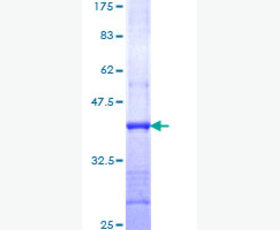Recombinant Cavia porcellus Interleukin-1 Beta/IL-1 beta
| Product name: | Recombinant Cavia porcellus Interleukin-1 Beta/IL-1 beta |
| Source: | E.coli |
| Purity: | Greater than 95% as determined by reducing SDS-PAGE. |
| Buffer Formulation: | Lyophilized from a 0.2 μm filtered solution of PBS, pH7.4. |
| Applications: | Applications:SDS-PAGE; WB; ELISA; IP. |
| Storage: | Avoid repeated freeze/thaw cycles. Store at 2-8 oC for one month. Aliquot and store at -80 oC for 12 months. |
| UOM: | 100ug/50ug/200ug/1mg/1g |
| Source | E.coli |
| Description | Recombinant Cavia porcellus Interleukin-1 Beta is produced by our E.coli expression system and the target gene encoding Thr115-Ser266 is expressed with a 6His tag at the C-terminus. |
| Names | Interleukin-1 beta; IL-1 beta; IL1B |
| Accession # | Q9WVG1 |
| Formulation | Lyophilized from a 0.2 μm filtered solution of PBS, pH7.4. |
| Shipping |
The product is shipped at ambient temperature. |
| Reconstitution |
Always centrifuge tubes before opening. Do not mix by vortex or pipetting. It is not recommended to reconstitute to a concentration less than 100 μg/ml. Dissolve the lyophilized protein in ddH2O. Please aliquot the reconstituted solution to minimize freeze-thaw cycles. |
| Storage |
Lyophilized protein should be stored at < -20°C, though stable at room temperature for 3 weeks. Reconstituted protein solution can be stored at 4-7°C for 2-7 days. Aliquots of reconstituted samples are stable at < -20°C for 3 months. |
| Purity |
Greater than 95% as determined by reducing SDS-PAGE. |
| Endotoxin | Less than 0.1 ng/µg (1 IEU/µg) as determined by LAL test. |
| Amino Acid Sequence |
MTPVPSRNCTLHDIQHKRLVLSDPCELKALHLNGDNLNRQVVFSMSFVQGERSDNKMPVALGLKG KNLYLSCVMKDGKPVLQLESVDGKQYPKKKMEKRFVFNKITSKSTVEFESAQFPNWYISTSQAEH KPVFLGNNNGQDIIDFKLELVSSHHHHHH
|
| Background | Interleukin-1 beta (IL1B) belongs to the IL-1 family. Interleukin 1 (IL-1) is a family of polypeptide cytokines consisting of two agonists, IL-1 alpha (IL-1F1) and IL-1 beta (IL-1F2) encoded by two distinct genes and perform identical biological functions. IL-1 stimulates thymocyte proliferation by inducing IL-2 release, B-cell maturation and proliferation, and fibroblast growth factor activity. IL-1 proteins are involved in the inflammatory response. It is identified as endogenous pyrogens, and is reported to stimulate the release of prostaglandin and collagenase from synovial cells. |














